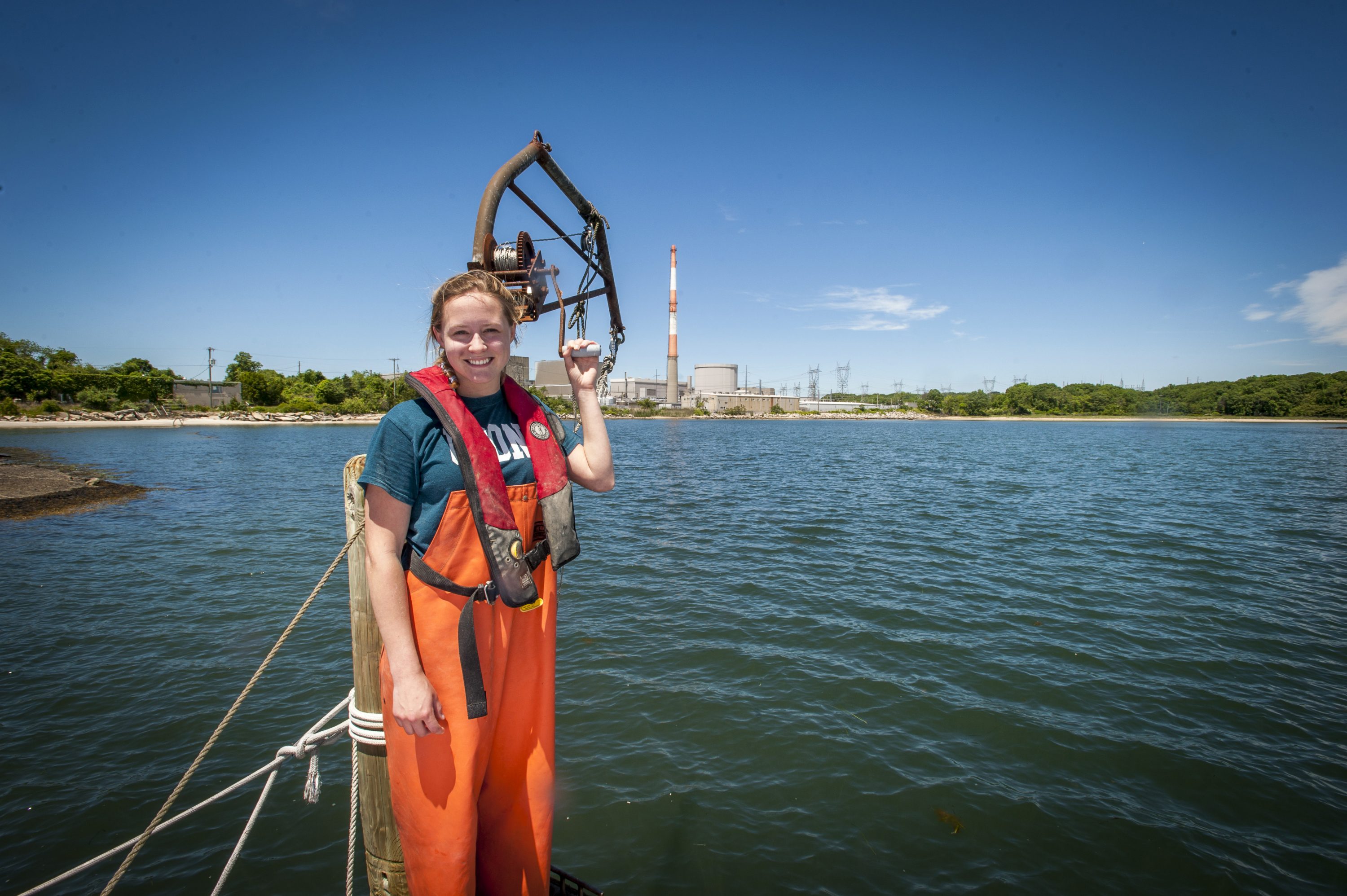For many, spending the summer on a boat – and getting paid for it – is a dream. But for Hannah Casey ’18 (CLAS), it’s been a challenge.
This summer, the 20-year-old environmental studies major from Haddam, Conn., has a 10-week internship at Dominion’s Millstone Power Station in Waterford, Conn., and it involves frequent boat trips. She is part of a team of interns and scientists who study the toxicity of storm water runoff and measure, tag, and study lobsters, flounder, plankton, and other aquatic life.
“We release everything that we catch,” she says. “I’m always doing something.”

Eager to learn, Casey gets up every morning at 4:45 a.m. to drive from her home to Waterford. She also musters up her courage and regularly travels on Dominion’s boat, despite her tendency to get seasick.
To make it through a day on the water, she takes Dramamine, which allows her to successfully complete her tasks. It also makes her tired, however.
“When we get off the boat, I just want to sleep,” she says with a laugh.
Casey is one of 238 interns working at Dominion’s seven locations this summer. Together, they represent 71 universities.
“I never imagined myself working in a nuclear power plant,” she says.
Unlike many of her peers, Casey’s paid internship comes with an added bonus: a $5,000 scholarship.
The opportunity to get hands-on experience in the environmental studies field and the promise of $5,000 led her to apply for Dominion’s Diversity Scholarship.
“I guess they needed more women in the field,” Casey says, still trying to rationalize how she received the unique opportunity to study the ecosystem near Millstone.
To be eligible for the scholarship, Dominion requires a minimum cumulative grade point average of 3.0 at an accredited two-year or four-year college. Only 21 students, including Casey, received the scholarship this summer, said Ken Holt, manager of communications for Millstone. Those students are working on a variety of projects, including power generation, corporate communications, pipeline engineering and environmental projects, and they are pursuing many different majors, such as mechanical engineering, chemistry, and accounting, he said.
At UConn, in addition to working toward her bachelor’s degree in environmental studies, Casey is simultaneously pursuing a master’s degree in public policy through a fast-track program. She’s not sure what the future will hold, but she plans to work in the environmental policy arena. She may even go to law school.
Spending the summer with Dominion has given Casey experience in her field. It has also taught her more about power plants.
Before interning with Dominion, Casey was neutral on the controversial issue of power plants, but not unfamiliar with the topic. Her father works for Dominion, and her grandfather worked for Connecticut Yankee, a power plant in southeastern Connecticut that no longer exists. Casey knows that many people believe that power plants are dirty, unsafe, and damaging to the environment. Her internship has taught her otherwise.
“They just don’t know a lot, and they fear,” Casey says of those who spread these stereotypes, explaining that she’s found the water in Niantic Bay and Long Island Sound to be clean, and boat and power plant safety to be a top priority.

In addition to navigating local waterways, Casey works in a Millstone lab, studying eggs and larvae, and she collects data for Millstone’s scientists, helping them to create an annual report on the environment for the state of Connecticut.
According to Holt, Millstone’s environmental monitoring program began in 1976 and is a requirement of the company’s National Pollutant Discharge Elimination System permit issued by the Connecticut Department of Energy and Environmental Protection.
“The protection of species and habitats on the lands, rights-of-way, and waterways around our facilities is an integral part of Dominion’s commitment to responsible environmental stewardship,” he said.
In addition to her busy work schedule, Casey also works with other interns at Millstone on community service projects. For example, they cleared brush at Waterford Country School.
“I’m actually still covered in poison ivy,” she said.
According to Holt, Dominion’s intern program provides the company with opportunities to recruit qualified and diverse talent as part of the company’s future workforce planning, and he says Dominion values the contributions of its interns and co-ops. So much so that Holt says 75 percent of Dominion’s interns receive job offers and join the company as full-time employees after they graduate college.
Dominion has nearly 15,000 full-time employees at its locations. Of that number, more than 1,000 work in Connecticut.
“Our interns quickly become integrated as part of our team during their internship, and many of them join our team full time upon graduating,” Holt said. “Many of Dominion’s executives and leaders began their careers as an intern or co-op for the company.”



